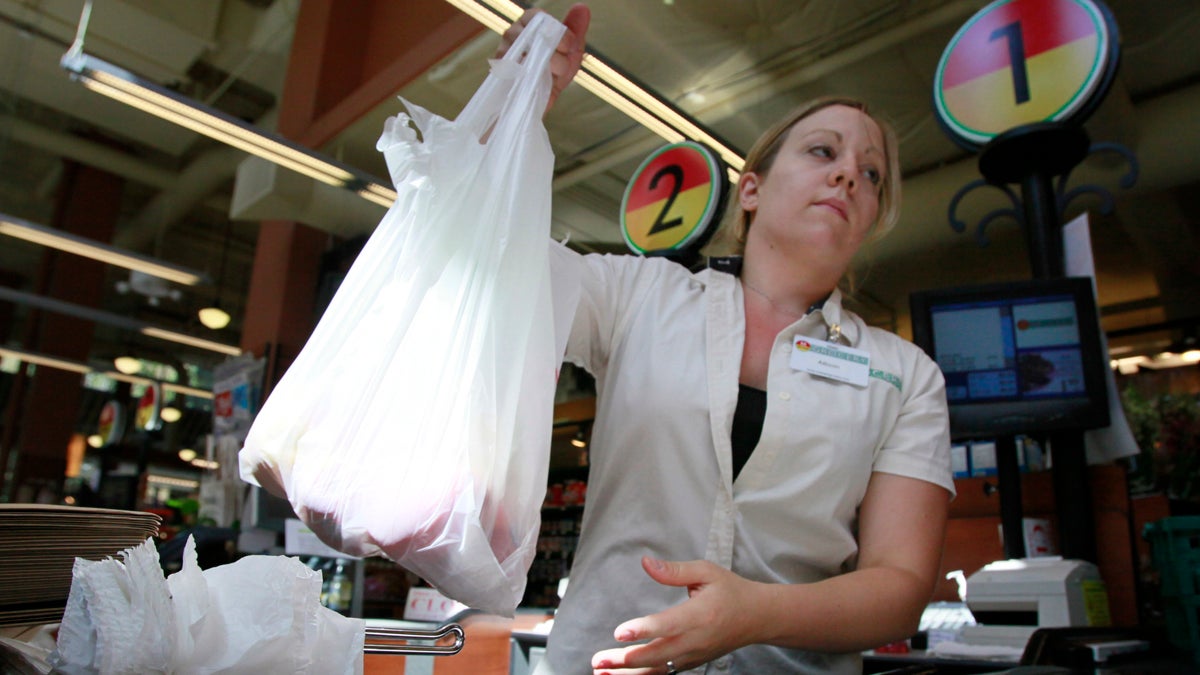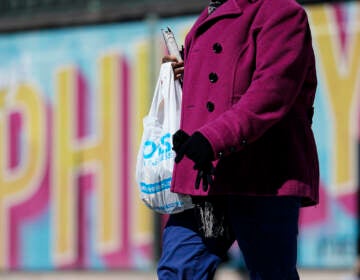N.J.’s strict plastic bag ban goes into effect next month
Stores in New Jersey will be prohibited from providing single-use plastic carryout bags, paper carryout bags, and polystyrene foam containers.

A cashier is pictured holding a plastic shopping bag with items inside. (Elaine Thompson/AP)
In one month, one of the nation’s strictest plastic bag bans will go into effect.
Beginning May 4, stores in New Jersey will no longer be allowed to provide or sell single-use plastic carryout bags or polystyrene foam containers (known widely by its brand name “Styrofoam”).
The law also prohibits stores from providing single-use paper bags, in a move lawmakers said would save energy and reduce harmful emissions.
Gov. Phil Murphy signed the measure in November 2020, giving stores and consumers a year and a half to prepare.
Lawmakers and advocates said the ban was needed in order to reel in pollution.
In 2018, the Environmental Protection Agency reported that 4.2 million tons of plastic bags were generated in the U.S. and only 10% of plastic bags were recycled.
Marine wildlife has especially been impacted.
“It takes a very long time to decompose…it just takes hundreds of years. But once they’re in the water, it’s sort of like it decomposes faster than a landfill, for example, but it turns into microplastics…that are then consumed by our wildlife,” said Anjuli Ramos-Busot, director of the Sierra Club New Jersey Chapter.
Speaking on WHYY’s “Radio Times” on Monday, Ramos-Busot argued that it’s more challenging to recycle single-use plastic bags than other forms of plastic.
“What makes [plastic bags] even worse than just your regular plastic is that they are non-recyclable, you cannot recycle them. They’re single use,” Ramos-Busot said. “And when you’re trying to recycle other types of plastics, and you have contamination with these plastic bags, that essentially ruins your entire batch of recyclable plastics.”
“Additionally, it sort of ruins the machinery for recycling. So they’re incredibly polluting for the environment. But they’re also damaging for our recycling infrastructure,” Ramos-Busot said.
Pankaj Lal, a professor of Earth and Environmental Studies at Montclair State University, said incremental changes like New Jersey’s plastic bag ban will go a long way in significantly reducing plastic use and pollution.
“We are not at the inflection point,” Lal said.
“Plastic is one [thing] that we can easily substitute and also it’s a behavioral change…” Lal said. “It’s a matter of habit, it’s a matter of adaptation.”
He pointed to examples in other places like California and Rwanda, where plastic bag bans have had a major impact in decreasing plastic pollution.
On May 4, people in New Jersey will have to provide their own single-use plastic bags or utilize reusable bags.
Convenience stores, pharmacies, and retail stores are exempt from the single-use paper bag ban, according to the state Department of Environmental Protection.
The new law imposes penalties for businesses that fail to adopt the single-use bag and container ban, including a warning for the first offense, a $1,000 fine for the second offense, and a $3,000 fine for subsequent offenses.

Get daily updates from WHYY News!
WHYY is your source for fact-based, in-depth journalism and information. As a nonprofit organization, we rely on financial support from readers like you. Please give today.






